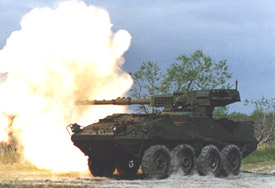Magazine (firearms)
Magazine is the name for a place where ammunition is stored. The term can be used for a place where ammunition for weapons that can be carried by a single combatant is stored. But it is also the name for a place where the ammunition for crew served weapons are stored.
Field magazine
It is important to protect the ammunition from the fire of one's antagonist's weapons, and from the effects of a malfunction of one's own weapons. So, if possible, it is desirable to armour the magazine. In the case of batteries of towed artillery the temporary magazine will be placed, if possible, in a pit, or natural declivity, or surrounded by sandbags or earthworks.
Historically, when artillery was powered by gunpowder, a vessel's magazine would be kept below water level. The gunner and his mates would wear felt slippers, or bare feet, to prevent sparks. The door to the magazine would be a wet, felt curtain. Light would be provided through a window, from an adjacent room. A naked flame was never allowed inside the magazine.
More modern warships used semi-automated or automated ammunition hoists for their main batteries. The path through which the weapon's ammunition passed would have blast-resistant airlocks.
Autoloaders

Prototype of the Mobile Gun System, firing the cannon in its remote controlled turret. Note the magazine, which can hold 18 x 105mm rounds.
Some modern artillery uses a preloaded magazine similar to a firearms magazine.[1]
References
- ↑ Background — Canadian Forces Mobile Gun System (MGS) Project, Canadian American Strategic Review. Retrieved on 2008-04-21.